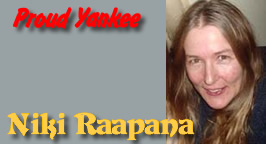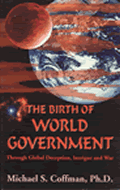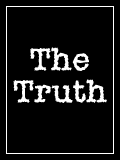INDIVIDUAL LIBERTY LOSES WITHOUT A FIGHT
By Niki Raapana
August 17, 2008
NewsWithViews.com
There's a lot more people in the U.S. using the word communitarian now. When I learned it in 2000, I found mainly references to it in upper academia, Free Trade Legislation, EU integration papers, and eventually (twice!) in the Washington Post. I looked it up online. I scanned every philosophy and political science text I could find. Not one textbook I've seen included it. It seemed to have appeared in Etzioni's head one day at lunch, just like he said it did. Nobody I met online besides Daniel New (UNFreeZones & Michael's father) had ever once heard the word, and while I do know of at least ten other writers who have included it in their articles, some people still accuse me of making it up.
There has been no place in academia for our approach, since our focus is on the way communitarian programs and policies thwart legitimate American law. I don't interpret individualism as an egotism endangering the stability of democracy, I interpret communitarianism as high treason against every legitimately created people's government in the world.
This is the usual academic approach to the communitarian versus individual theoretical divide, from an abstract posted by the University of Heidelberg:
Christian Maul (HCA PhD in American Studies Scholarship, Landesgraduiertenförderung): "Henry David Thoreau's Concept of Individualism in the Light of Communitarian Theory."
"Emanating from my MA thesis, my PhD project explores the representation of a core value of American identity, individualism, in the works of the influential transcendentalist Henry David Thoreau, who created one of the most consistent concepts of American individualism and the image of an economically and intellectually autonomous self. From the point of view of modern political philosophy, however, Thoreau's approach to individual autonomy seems to have lost its value; communitarian philosophers such as Michael Sandel, Michael Walzer, and Charles Taylor argue that individualism interpreted as egotism endangers the stability of democracy as it exposes the self to a process of de-solidarization. In fact, the communitarian movement pleads for a return of the individual into the community through active participation in democratic processes and institutions. Thus, the modern American individual exists in an area of tension between individualism and social commitment. In my current research work, I am developing a model for the interpretation of the relationship between the individual and society and of Thoreau's concept of individualism from a communitarian perspective. This model is based on major writings of communitarian theorists and depicts the ideal communitarian self by tracing fundamental characteristics of an American self which interacts with the social forces surrounding it. My further research interests include the contemporary American novel, autobiographical literature, and American-German literary interrelations." Primary supervisor: Professor Dr. Dieter Schulz
I'm living proof that there has never been any funding for anti communitarian studies in the United States. If it hadn't been for a few generous private doners and people purchasing 2020, I would have starved to death, been found slumped over my laptop, still trying to find more evidence to convince Americans communitarianism is a REAL threat to their liberty.
Since April 2000, I've written thousands of letters to academic institutions around the globe asking for assistance with our opposition thesis. When our 2002/3 ACL thesis was included in a sociology class at Vassar College Spring 2008, I thought that would open up the debate to include opposition arguments. As recently as last month I wrote the Ludwig von Mises Institute, the bastion of individualist economic theory. Dead silence is all I ever hear back.
I've been attacked and ridiculed for years for refusing to shift my focus away from communitarianism. I've been advised more than once to start using a term Americans were more "familiar" with. The Libertarian Party told me they only use terms Americans can understand. The Democrats told me I sound like a Right Wing Property Rights wacko; Nancy Rising wanted me to include Jim Marrs' alien theory in my work. The Nebraska Republicans told Michael Shaw I look like a nutcase because I live in a tent. People who said they wanted to "help" ALWAYS told me told me the word was just too long and too hard to spell, so I should quit using it. Just recently I was asked to shift my educational focus to a bumper sticker with the words, "Sustainable development is a UN coup against Americans."
In the past year I've seen my work plagiarized by Dave Hodges of the Arizona Constitution Party, I've been hounded for not submitting to the Fusionist Borg and the Wizard of Oz characters who followed Terry Catzman666 Hayfield to leftrightunite, and I have serious doubts about the Bridgestone Media Group's purpose for including my interview in One Nation Under Siege. To top it all off, Nancy Levant, who became a dear friend and a prolific vocal opponent of communitarianism suddenly stopped emailing me last fall. I have only Darren Week's assurance that she is just taking a break because she works as a field laborer all the time now, and there's no internet where she lives.
Now, without any fanfare or apologies from anyone, I can find hundreds of references to communitarianism on all kinds of websites and online magizines. People all over the place are talking about it, almost as if it's been around forever. It's as if everyone should already know what it is. This article in the National Review on June 30, 2008 by Michael Know Beran refers to it hitorically, assuring us it's always been part of American politics:
"The late Arthur Schlesinger Jr. once opined that the United States vacillates between phases of glittering, communitarian "public purpose," associated with appealing patrician showmen like the Roosevelts, and drab, profit-seeking "private interest" periods presided over by presidents so boring no one remembers their names. Amid his many errors, Schlesinger was right in perceiving that the idea of communitarian public purpose has a glamor, a charm, a way of touching the high-minded, generous instincts of the soul, that the ethos of profit-and-loss will never match, golden-egg-laying goose though it be."
Try
to access Schlesinger's articles without paying for them, take this
search link leading to JSTOR:
* Review: [untitled]
* Arthur Schlesinger, Jr.
* Reviewed work(s): Tomorrow A New World: The New Deal Community Program
by Paul K. Conkin
* The American Historical Review, Vol. 65, No. 4 (Jul., 1960), pp. 933-934
(review consists of 2 pages)
* Published by: American Historical Association
Note: This article is a review of another work, such as a book, film, musical composition, etc. The original work is not included in the purchase of this review.
So how is it possible that the whole "Idea" just popped into Etzioni's head in 1990 if thirty years earlier, Arthur Schlesinger Jr. was talking about communitarianism in his review of the New Deal Community Program? Beran's article continues:
"Americans, with their democratic traditions, have an aversion to the word "aristocracy," but not to the idea of it, which, in its most innocent and natural form, merely acknowledges what everyone knows to be true--that in any one of the various departments of life, some people are vastly superior to others."I suspect that many voters might even be persuaded to distinguish between aristocracy's more- and less-salubrious forms. Of the two competing patrician philosophies on the hustings this year, one of them, McCain's, represents the aristocratic ideal in its prime, when the knight aspired to fight the good fight. The other, Obama's, represents the patrician ideal in its decadence, when the novice qualifies for the exercise of public power by dreaming the good communitarian dream."
What is the "good communitarian dream?" It's a vision of peace, health and happiness for everyone in the world. Visualize Heaven and you still can't imagine how beautiful it will be. Once the state is allowed to achieve its evolutionary role and become our god, anything is possible.
In Barack Obama, Americans have found their Hegelian Messiah. Protecting individual rights, the only legitimate purpose for American governance and law, has been slowly replaced with communitarian values. Obama was named the Wonder Boy for the Third Way back in 1994. Hillary Clinton uses the term communitarian to describe more enlightened voters. Both Democratic candidates for U.S. president are committed communitarians. Yet the Republican candidate McCain and the darling of the Independents, Dr. Ron Paul, both studiously avoid addressing the theory of communitarianism in any of their speeches. IF ONLY ONE of the above candidates had openly explained the new theory of community government, ALL Americans would have had the opportunity to choose between liberty and slavery. But none of them did.
The American conservative right has proved itself to be the perfect thesis to the necessary antithesis, cleverly never alerting their followers to the real deception, keeping loyal patriots behind the times by using outdated terms like caplitalism, communism and socialism to describe communitarianism. As a result of this concerted effort to keep Americans dumbed down, Individual Rights, the basis for the ENTIRE American political system, is now what's defined as "outdated."
Watch closely as millions of Americans scramble to catch up with the newspeak. Our free people will never know how many thousands of enlightened Americans are already receiving trillions of grant dollars to fund the emerging communitarian vision, but they will quickly find out that if they object to the mandatory community service theory or refuse to cooperate with the communitarian datagatherers or developers, they will be ridiculed and ostracized by the more spiritual members leading the new American collectives.
|
Subscribe to the NewsWithViews Daily News Alerts! |
The entertaining drama that is called "democracy" in the U.S. is about to drop the final curtain on the authentic American dream. Americans aren't voting for a new president in the national election this fall. They're voting for a new god.
Notes:
"McCain's
challenge: how to preempt Barack's communitarian dream," National
Review, June 30, 2008 by Michael Knox Beran











